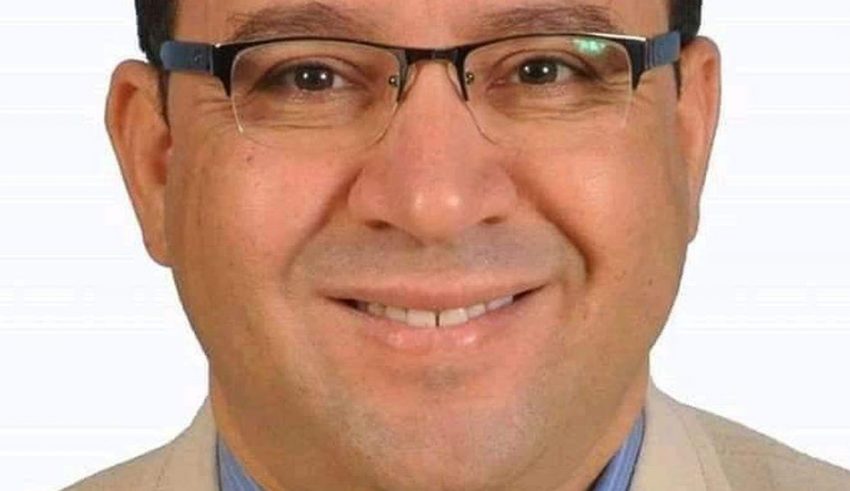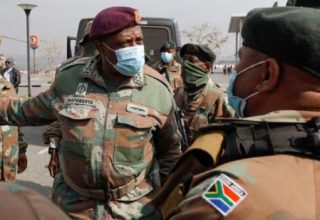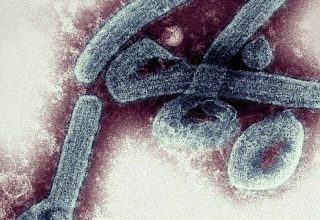
The death from Covid-19 of Dr Ashraf Emarah, a senior plastic and reconstructive surgeon in Kenya, last month highlighted the plight of medics who are demanding more protection for those on the frontline of the battle against the pandemic, as Basillioh Mutahi reports.
When the surgeon, one of the top specialists in western Kenya, contracted the virus and his condition worsened there were no intensive care (ICU) beds available at his hospital – the Moi Teaching and Referral Hospital (MTRH) in Eldoret.
Dr Emarah had taught medical students at the MTRH, the country’s second biggest referral hospital, for decades.
The doctor’s family and colleagues then tried to get him transferred to the capital, Nairobi, hundreds of miles away.
But the cost of getting an air ambulance evacuation, was “too expensive”, a doctors’ union official said. A vital drug that he needed when his situation became critical was also hard to afford.

“Doctors had to contribute to buy the drug” to stabilise him, Dr Chibanzi Mwachonda, the acting secretary-general of the Kenya Medical Practitioners, Pharmacists and Dentists Union (KMPDU), told a parliamentary committee.
“It was a very sad situation,” Dr Mwachonda said, pointing to the fact that doctors did not have comprehensive medical cover from the national insurer.
The ailing doctor was taken to a private hospital in Nakuru, a town roughly halfway between Eldoret and Nairobi, where he waited for an ICU bed to become available in the capital.
But just a day later, on Friday 13 November, he died.
Shortage of doctors
Dr Emarah was the fourth specialist doctor to die that week, a grim statistic in a country where there are about 7,000 doctors for a population of 48 million.
Tragic week for the Medical Profession after losing four Senior Specialists in one week.
1. Dr. Emarah Ashraf
2. Dr. Vladimir schuckin
3. Dr. Hudson Inyangala
4. Dr. Robert Ayisi
KMPDU urges all doctors to abstain from duties where the work environment is unsafe. pic.twitter.com/BIB5Wk5Vp5— KMPDU (@kmpdu) November 13, 2020
A week before his death, he had been conducting surgery and supervising students, before developing symptoms days later, his friend Dr Anthony Akoto told the BBC.
“He died on the frontline, in the line of duty,” said Dr Akoto, who is also a union official, noting that the death had taken away the only plastic surgeon of his experience in western Kenya.
“The country has very few plastic surgeons. At his level, we only had him, though we have some other upcoming surgeons, but we still have gaps.”
Kenya’s medical practitioners’ board listed only four specialist plastic and reconstructive surgeons in the country by 2018.
An Egyptian by birth, Dr Emarah who arrived in the country about 30 years ago, has been described by colleagues as a mentor, teacher and brilliant surgeon who will be greatly missed.
‘I don’t think I’m going to make it’
The doctor was well known for the surgical repair of thousands of children born with cleft lip palate, helping them to smile, and passing on his experience to surgeons in neighbouring countries including Somalia, Uganda and the Democratic Republic of the Congo.
“We deeply mourn our dear friend and partner,” Smile Train Africa, one of the charities he worked with said, tweeting a picture of the doctor along with some of the children he had operated on.
“Our heartfelt condolences to his wife and children, friends, colleagues, the cleft patients he touched during his lifetime journey of smiles and surgeons he trained who carry on his legacy.”

Since coronavirus arrived in the country in March, at least 14 doctors have died in the wake of the pandemic.
On Monday, the KMPDU announced that Dr Stephen Mogusu died after contracting Covid-19.
On top of this, at least 20 nurses and 10 clinical officers have passed away from the virus.
Overall, at least 2,000 health workers have been infected with the virus, including Dr Mwachonda, the medical union’s top official, who recently described the heavy burden it had on his mental state.
“It’s the toughest period I have had this year… At some point I had given up – I was like: ‘I don’t think I’m going to make it,'” he told local television station NTV.
The coronavirus infection numbers in Kenya have been increasing again in recent weeks, with November recording the highest number of daily infections as well as deaths since the pandemic began in the country.
The country has so far recorded more than 88,000 coronavirus cases, including over 1,500 deaths.
‘We need to be protected’
Dr Doreen Lugaliki, an obstetrician/gynaecologist, was the first Kenyan doctor to succumb to coronavirus. She was 39 when she died on 10 July.

In the week of Dr Emara’s death, Dr Vladimir Schuckin, a bariatric surgeon, Dr Hudson Inyangala, a public health specialist and Dr Robert Ayisi, a paediatrician all died. The union urged doctors to abstain from duties “where the environment is unsafe”.
With the death of more specialist doctors, and the government seemingly unable to immediately address the situation, the doctors called for a strike starting 7 December. before suspending it for two weeks, to give room for further talks.
“How do you fight a war when all your soldiers are falling in numbers? We need to be protected,” Dr Mwachonda told the parliamentary committee.
As he spoke about the dire environment under which Kenyan health workers work, some of the MPs broke down.
Two other unions representing nurses and clinical workers, who have proceeded on strike, also protested against unsafe working conditions and what they consider the government’s poor handling of the coronavirus pandemic.
The unions have cited a combination of inadequacies in public hospitals including poor facilities, staffing shortages, insufficient protective working equipment and lack of a comprehensive medical insurance, which has contributed to an, “extremely difficult, draining, hazardous and injurious working environment”.
“We feel the government has abandoned health care workers, who are literally on their own. We do not have enough protective equipment, doctors are contributing money for medical bills when one falls sick in the line of duty,” Dr Akoto told the BBC.
“We feel the government is not taking this matter seriously.”
‘Facing an enemy without defence’
The health ministry has acknowledged some of the issues raised by the unions, but has denied that it had neglected the workers, saying their needs would be met and noted ongoing consultations.
“Neglecting our soldiers would be tantamount to facing an enemy without any defence,” Health Cabinet Administrative Secretary Mercy Mwangangi said.

Some of the problems in Kenya’s health facilities have been linked to corruption, and there have been allegations that some of the funds earmarked for the fight against coronavirus have been diverted to other purposes.
In September, the country’s anti-graft agency recommended charges against top officials at the Kenya Medical Supplies Authority (Kemsa) accused of awarding tenders that led to the irregular expenditure of funds. The matter is still under investigations after the top prosecutor declined to approve charges. Those named have denied any wrongdoing.
“It is very discouraging… We have some doctors who have been on the frontline, fighting against this pandemic and they have not been paid for four months, yet you hear that at the health ministry and Kemsa, we have lost billions of shillings through corruption,” Dr Akoto told the BBC.
Source: bbc.com

















